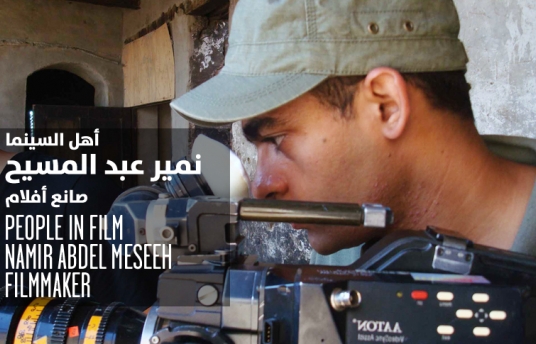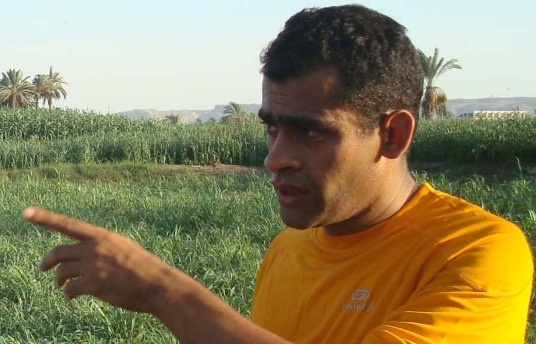أهل السينما: نمير عبد المسيح
10 يناير 2012

ولد نمير عبد المسيح في العام 1974، وعاش طفولته المبكرة في صعيد مصر. يقيم حالياً في فرنسا حيث نال شهادة الماجستير في علوم السينما من جامعة باريس 7 ، بعد أن درس الإخراج في المدرسة الوطنية العُليا لمهن الصورة والصوت. قام بإخراج فيلمين قصيرين قبل التطرّق إلى مسائل شخصية أكثر عمقاً في فيلمه الوثائقي “أنت، وجيه”.
آخر أعماله الفيلم الوثائقي “العذراء، الأقباط وأنا“، المستوحى من فيلم سجّل ظهور مريم العذراء في القاهرة. على غرار الملايين من الأقباط شاهد عبد المسيح الفيلم مع والدته التي تمكّنت من رؤية العذراء على الشاشة في حين أنه عجز عن ذلك. دفعه التشكيك بمضمون الفيلم إلى العودة إلى مصر والعمل على فيلم يهدف إلى اكتشاف خلفيات هذه الظاهرة الغريبة. حظي الوثائقي على الاعجاب في مهرجان الدوحة ترايبكا 2011 ، وحصد جائزة أفضل فيلم وثائقي عربي.
مؤسسة الدوحة للأفلام: تهانينا على جائزة أفضل فيلم وثائقي عربي في مهرجان الدوحة ترايبكا 2011، كيف تصف لنا شعورك حيال ذلك؟
عبد المسيح: شعرت حقاً بالسعادة، عزز ذلك ثقتي بنفسي.
مؤسسة الدوحة للأفلام: ما الذي دفعك إلى صناعة هذا الفيلم الوثائقي المثير للجدل؟
عبد المسيح: في البداية، دفعتني الرغبة في اكتشاف المزيد عن ظاهرة رؤية مريم العذراء، إلاّ أنني اكتشفت السبب الحقيقي بعد الانتهاء من العمل على الفيلم. ربما أردت العودة إلى عائلتي فحسب، بعد أن تغرّبت عنها، ولم أجد الوسيلة للتواصل معها مجدداً، شعرت بأن إخراج الفيلم قد يكون الطريقة الأنسب.
مؤسسة الدوحة للأفلام: علمنا من خلال مشاهدتنا للوثائقي أن والدتك لم تكن موافقة على أن تصوّر فيلمك في مصر، كيف تصف لنا ردة فعلها عندما شاهدته؟
عبد المسيح: في البدء ضحكت كثيراً، وهذه كانت إشارة جيدة، لكن بعد حين، طلبت أن تشاهد الفيلم مرة أخرى لكي أقوم ببعض التعديلات عليه أثناء المونتاج، فأخبرتها بأنني أضعت النسخة القابلة للتعديل.
مؤسسة الدوحة للأفلام: ماذا تخبرنا عن ردّة فعل المشاهدين، علماً بأنك تطرقت في فيلمك إلى موضوع ديني؟
عبد المسيح: كانت الردود إيجابية، ما يؤكد أن كل المواضيع قابلة للنقاش، عندما نقبل المخاطرة، كل الأمور تصبح على ما يرام.

مؤسسة الدوحة للأفلام: هل تشعر بأنك مصري أم فرنسي أكثر؟
عبد المسيح: أشعر بأنني فرنسي من الناحية الفكرية، ومصري من الناحية العاطفية.
مؤسسة الدوحة للأفلام: ما هي أبرز التحديات التي تواجهك كصانع أفلام؟
عبد المسيح: أن أتلقى حقوقي المادية عندما أنجز عملي!
مؤسسة الدوحة للأفلام: ما هو تأثير الربيع العربي على صناعة الأفلام الوثائقية وعلى السينما المستقلة في المنطقة؟
عبد المسيح: مصر هي دولة تتعدد فيها الطبقات الاجتماعية، في حين أن صناعة السينما كانت حكراً على النخبة من المجتمع. كان على من يرغب دخول مجال صناعة الأفلام أن يلتحق بكلية السينما، وقد حالف الحظ قلةً من أبناء العائلات الميسورة للالتحاق بتلك الكلية. تزامن الربيع العربي مع عصر الهواتف النقالة والكاميرات الرقمية، وأصبح بإمكان أي كان أن يروي القصص. وهذا الأمر يثري السينما ويعطيها بعداً جديداً.
نحن تأثرنا بشكل كبير بالثورة، وهو الأمر الذي يصعّب علينا مهمة صناعة الأفلام إن لم تكن هناك زاوية مختلفة نتناول الأمور من خلالها، أعتقد بأننا بحاجة إلى سنوات قليلة من أجل تكوين فكرة شاملة عن الثورة.
مؤسسة الدوحة للأفلام: هل تعتقد بأن الأفلام الوثائقية ستتصدر مجال صناعة الأفلام؟
عبد المسيح: لا أعلم، ولا أعتقد بأن هناك فرق ما بين فيلم وثائقي أو روائي، ما دام المحتوى جيداً.
مؤسسة الدوحة للأفلام: من هو صانع الأفلام الذي يلهمك؟
عبد المسيح: لويس بونويل، أثّر بي بشكل كبير.
مؤسسة الدوحة للأفلام: ما هي الرسالة التي توجهها لصنّاع الأفلام الشباب في المنطقة؟
عبد المسيح: اتبعوا ما تؤمنون به. لا تأبهوا بالفشل طالما أنكم تعبرون عمّا بداخلكم!